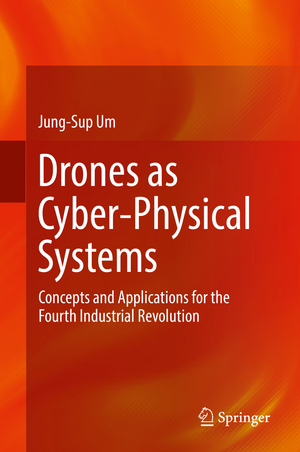Drones as Cyber-Physical Systems: Concepts and Applications for the Fourth Industrial Revolution
Autor Jung-Sup Umen Limba Engleză Hardback – 20 feb 2019
A short introduction sets CPS in the context of the 4th industrial revolution, and describes various CPS technologies including self-driving cars, commercial intelligent drones and mobile robots, in which artificial intelligence routinely supports smarter decision-making. The core of the book then focuses on commercially available drones, the only available system offering the advantage of cyber-physical bridging through 3D autonomous dynamic flying in classroom conditions. Chapters describe drone technology, including location sensors and imaging systems. CPS theory is explained through typical drone flying procedures and do-it-yourself (DIY) aerial photography in which communication between sensors, actuators and controllers occurs through cyber-physical bi-directional bridging.
This book opens new possibilities in fostering 4th industrial revolution literacy, introducing relevant examples from readily available equipment, making core elements of cyber-physical bridging accessible. It is aimed primarily at those students who have an interest in CPS, drones and those from disciplines that are concerned with spatial information.
Preț: 950.52 lei
Preț vechi: 1159.17 lei
-18% Nou
Puncte Express: 1426
Preț estimativ în valută:
181.88€ • 190.38$ • 151.38£
181.88€ • 190.38$ • 151.38£
Carte disponibilă
Livrare economică 10-24 martie
Preluare comenzi: 021 569.72.76
Specificații
ISBN-13: 9789811337406
ISBN-10: 9811337403
Pagini: 274
Ilustrații: XIII, 274 p. 63 illus., 50 illus. in color.
Dimensiuni: 155 x 235 mm
Greutate: 0.59 kg
Ediția:1st ed. 2019
Editura: Springer Nature Singapore
Colecția Springer
Locul publicării:Singapore, Singapore
ISBN-10: 9811337403
Pagini: 274
Ilustrații: XIII, 274 p. 63 illus., 50 illus. in color.
Dimensiuni: 155 x 235 mm
Greutate: 0.59 kg
Ediția:1st ed. 2019
Editura: Springer Nature Singapore
Colecția Springer
Locul publicării:Singapore, Singapore
Cuprins
Chapter 1. Introduction to the 4th industrial revolution.- Chapter 2. Drone flight ready.- Chapter 3. Cyber systems.- Chapter 4. Physical systems.- Chapter 5. Location sensors.- Chapter 6. Imaging sensors.- Chapter 7. Valuing cyber-physical bridging intensity of drone.- Chapter 8. Futurology and future prospect of drone CPS.
Notă biografică
Jung-Sup Um received his PhD from the University of Aberdeen in 1997. He is currently a Professor of Geography at Kyungpook National University. His field of interest is applications of Cyber-Physical systems, focused on smart drones in relation to Remote Sensing and GIS. Prof. Um is Editor in Chief of journal, Spatial Information Research since 2015.
Textul de pe ultima copertă
This book introduces the concept of using drones as a teaching tool to explore the fundamental principles, technology and applications of Cyber-Physical Systems (CPS).
A short introduction sets CPS in the context of the 4th industrial revolution, and describes various CPS technologies including self-driving cars, commercial intelligent drones and mobile robots, in which artificial intelligence routinely supports smarter decision-making. The core of the book then focuses on commercially available drones, the only available system offering the advantage of cyber-physical bridging through 3D autonomous dynamic flying in classroom conditions. Chapters describe drone technology, including location sensors and imaging systems. CPS theory is explained through typical drone flying procedures and do-it-yourself (DIY) aerial photography in which communication between sensors, actuators and controllers occurs through cyber-physical bi-directional bridging.
This book opens new possibilities in fostering 4th industrial revolution literacy, introducing relevant examples from readily available equipment, making core elements of cyber-physical bridging accessible. It is aimed primarily at those students who have an interest in CPS, drones and those from disciplines that are concerned with spatial information.
A short introduction sets CPS in the context of the 4th industrial revolution, and describes various CPS technologies including self-driving cars, commercial intelligent drones and mobile robots, in which artificial intelligence routinely supports smarter decision-making. The core of the book then focuses on commercially available drones, the only available system offering the advantage of cyber-physical bridging through 3D autonomous dynamic flying in classroom conditions. Chapters describe drone technology, including location sensors and imaging systems. CPS theory is explained through typical drone flying procedures and do-it-yourself (DIY) aerial photography in which communication between sensors, actuators and controllers occurs through cyber-physical bi-directional bridging.
This book opens new possibilities in fostering 4th industrial revolution literacy, introducing relevant examples from readily available equipment, making core elements of cyber-physical bridging accessible. It is aimed primarily at those students who have an interest in CPS, drones and those from disciplines that are concerned with spatial information.
Caracteristici
Shows how AI (artificial intelligence) drones can be used in teaching, especially in classroom conditions where contact with real CPS (Cyber-Physical Systems) equipment is limited Illustrates the concept of cyber-physical bridging throughout do-it-yourself (DIY) aerial photography Sparks learning motivation throughout do-it-yourself (DIY) CPS experiences, showing real drone technology in typical flying procedures
